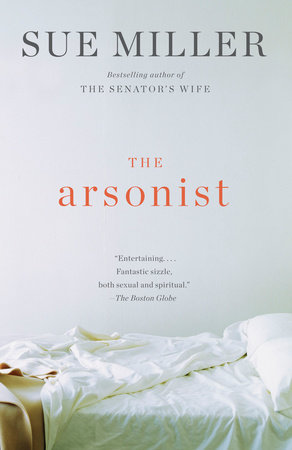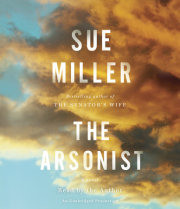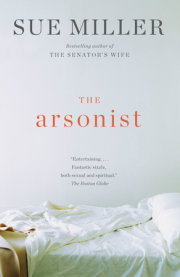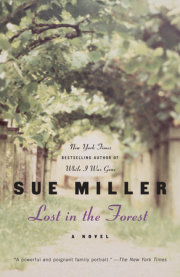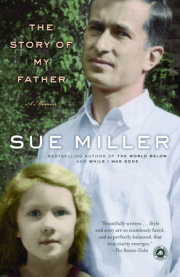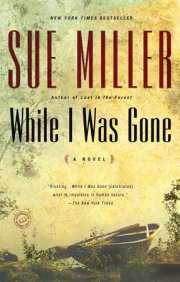I
Later, Frankie would remember the car speeding past in the dark as she stood at the edge of the old dirt road. She would remember that she had been aware of the smell of smoke for a while. Someone having a fire, she had assumed then, and that would turn out to be correct—though not in the way she was imagining it. She had the quick thought, briefly entertained amid the other, rushing thoughts that were moving through her tired brain, that it was odd for someone to be doing this, having a fire this late—or this early—on an already warm summer night.
But in the moment she didn’t go beyond her quick assumption, her fleeting thought. She smelled the smoke, she saw the car approaching, and she got quickly out of the road, stepping first into the ditch that ran alongside it, and then, because it was night and she worried that the driver might not see her in the dark, onto the scrubby bank, pulling herself up between two trees that stood there. By the time she turned around to face the road again, the car had passed her. She stood for a moment watching as the wink of the red taillights disappeared behind a rise in the road, appeared again, dropped from sight, and appeared once more; and then was gone, the car’s sound fading into nothing, into the rustle and odd croak of the night. She’d been walking for more than an hour by then, awash in memories and images of the life she’d just left behind.
She’d waked, as she’d known she would, at about one-thirty, and in her jet lag and confusion, she didn’t know where she was, or even, for just a second or two, who she was. She’d felt this way only a few times before in her life—in childhood mostly—a disorientation so profound that it momentarily wiped her consciousness clean. It left her breathless now, too, her heart knocking hard in her chest as she lay there slowly feeling the room and her life—her sense of being precisely herself, Frankie—return and settle around her. It took her a few seconds longer than that, though, to understand why she might be here, in this room that meant summer, family.
She lay still for a while, feeling her body grow calm again, taking in the familiar shapes in the dark around her. The clock next to her on the bedside table glowed greenly—now 1:40, now 1:45. She turned on her back and stretched. She heard an animal screech somewhere far off and the tick of something shifting somewhere in the old house.
Two o’clock.
Okay, sleep wasn’t going to come again for a while. She got up. She dressed in the dark, pulling on the same clothes she’d shed onto the floor five hours earlier when she’d come, exhausted, upstairs to bed. Carrying her shoes in her hand, she went into the black hall, found the stairs, then the smooth wooden handrail, and descended slowly, each step loudly protesting her weight, even though she tried to stay at their edges on the way down.
The bright moonlight fell into the living room, clearly delineating the furniture. She could see the deep old slipcovered chairs hunkered companionably by the fireplace. This was where her parents sat on chilly nights, usually reading. The couch was turned toward the view of the mountains. Behind it, the globe of the earth with its obsolete borders and nations was bulbous in its wooden stand. The chest of drawers that held dress-ups and puzzles and games—Monopoly and Clue, Parcheesi, Scrabble—was a large dark block in the far corner of the room. She could hear her parents’ twinned snoring from their bedroom in the new wing down the hall from the kitchen, the wing they’d built this past year because they were retiring—retiring to this farmhouse they had used as a summer home for as long as Frankie could remember. She stood still and listened for a long moment. She thought she could distinguish one from another, her father’s snores low and regular, the proverbial sawing of logs; her mother’s more intermittent, more fluttery.
She thought of their faces as they’d looked at the dining room table earlier tonight, both turned to her inquisitively, both seeming to ask to understand something of who she was now, both seeming to want something from her, something she could feel herself pulling against giving, as usual.
She had a sense, suddenly, of how useless it was, that reflex. Probably they were just being polite. Probably the questions they were asking had been designed to keep the sense of a conversation going. Her resistance seemed to her now the residue of some childish impulse that had stayed with her into adulthood, the impulse to keep her life from them, not to let them own it.
She sat down in one of the chairs by the fireplace. As she bent to pull on her shoes, the smell of old ashes rose toward her, and she felt flooded with a sense of nostalgia—but a kind of aimless nostalgia. She couldn’t locate its source. Nostalgia for this place? For something in her past here? Or, perhaps, lost to her, in her past elsewhere? She sat there for a long moment, swept by this formless, hungry feeling.
Then she stood up, walked through the dining room, the kitchen, and came outside, setting the screen door of the little porch carefully, soundlessly, back into its wooden frame.
The moon was bright here, bright on the mown grass around the house and the field beyond it, bright on the gravel driveway that led to the blackness of the trees at the driveway’s end. The air was cool and smelled fresh after the closed-in warmth of the house. The noise of the gravel under her shoes seemed explosively loud.
When she got to the road, she turned left, away from town, and emerged from the dark well under the trees. The moon made a glowing white band of the road in front of her, made the woods on each side of the road read as more deeply black. As she walked, she was going over the steps that had brought her here the day before, a day that had gone on and on, that had lasted more than thirty-two hours as she traveled north and then west, across continents and oceans and time zones.
She saw herself in Lamu, climbing down onto the old wooden ferry that plied the water between the island and the airport, holding the hand of the weather-beaten, skinny ferryman as she stepped from the pier to the boat’s edge, then to the built-in bench that curved inside along its hull, a bench covered in fresh straw matting. There were assorted other travelers waiting to be helped on, too, including a few tourists and a fat woman wearing a buibui. She looked ancient, her heavy, sallow face deeply lined, but Frankie knew from experience in Africa that she might have been only a few years older than she herself was. The woman was carrying two live chickens, white and plump, held upside down. This seemed calming to them. They were quiet anyway, they jerked their heads back and forth, looking around with a mild disinterest at everything within their purview.
The last to arrive were two younger women in head scarves. Once the boat had pushed off from the dock, once the ancient motor had caught and they were out on the choppy gray water, the girls pulled their scarves off, and the breeze lifted their thick dark hair. One of them closed her eyes and shook her head slowly in pleasure.
During the short trip across the channel, Frankie watched the dhows heading out to sea or returning, the one belling lateen sail turned this way or that to catch the wind. She looked back at the stone town rising behind the dusty waterside quay. She’d stayed for just four days this time, alone in one of the tall town houses. She’d slept out on the rooftop under a lattice covered with jasmine and bougainvillea and waked before dawn each morning to the electronically amplified call to prayer, to the rich erotic smell of the jasmine. She’d walked the streets slowly, avoiding the open-water channel, the meandering donkeys. She looked into the open shops, she bought food and trinkets from the street vendors. She’d wanted to mark what she thought might be the end of her life in Africa, and this was a place she had particularly loved.
On the other side of the wide channel, everyone disembarked in nearly perfect reverse order and walked up the sandy path to what constituted the airport—a few thatched-roof pavilions and huts where others were waiting, a short runway with a small plane parked on it. Everyone, including the chickens, got into this plane, each person having to lower her head when she passed through the narrow, low door hatch.
As they flew, Frankie leaned against the window and watched the plane’s winged shadow move across the steady brown and green of the savanna below. Occasionally they passed over a village with thatched roofs, or tin roofs winking in the sunlight, and Frankie could see the rising smoke from cooking fires and people standing in the cleared spaces of red dirt, looking up, shading their eyes.
In Nairobi, she took a taxi home. She repacked her small bag quickly. Then she carried it, wheeling her larger bag, too, out to where the taxi driver waited at the gate by the guardhouse, talking in Kikuyu to Robert, the day guard. As the cab took her back to the airport, the sun set quickly, undramatically, equatorially: day, then night.
The driver helped her into the chaos of the brightly lighted airport with her large bag, and she checked it through to Boston. Then there was the long wait in uncomfortable orange plastic chairs for the plane to Amsterdam, delayed for some reason or other, as planes in and out of Nairobi often were. It was almost midnight when she finally boarded and settled into her seat. A tall blond flight attendant with thick, almost clownish makeup came by with a warmed hand towel, then with a packet containing socks, a miniature toothbrush with a tube of toothpaste, and a sleep mask. Frankie had the sense of the beginning of different rules for life, different expectations. The note of improvisation was falling away, the developed world was beginning to encircle her.
The sky outside the plane was dark, and she slept, a broken, uncomfortable sleep, alternately too hot and too cold and full of vivid, disturbing dreams she couldn’t remember when she woke. The plane was squalid as they disembarked, blankets and pillows thrown on the floor along with trash, newspapers. She saw little empty nip bottles wedged into seat-back pockets here and there.
In Amsterdam, where it was morning, the airport smelled of espresso, there were expensive first-world goods for sale in the shops, there were people at computer stations and on cell phones, there was real luggage—not boxes taped and tied, not old suitcases held together with ropes. Frankie had a two-hour wait. She wandered in and out of the duty-free shops for a while, though she didn’t buy anything. She startled herself with her reflection in a mirror in front of a perfume shop. She stopped and stepped toward it. She didn’t look particularly American—a tall woman wearing a white blouse and khaki pants, her long wavy red hair pulled back, her pale face washed out without makeup. A missionary from Scotland, she thought. A dour anthropologist from the Netherlands. A very tired missionary or anthropologist. She went into a women’s bathroom and washed her face with the odd-smelling soap. She brushed her hair. She put on fresh eye makeup. She didn’t look very different, but she felt better.
On the flight to Boston, there was a movie, astonishing to Frankie in its stupidity and crudeness. Was this all right now in the States? Had she lived in Africa too long? She looked around at the others watching it with earphones in, watched as their faces changed in amusement. From time to time, she heard the ripples of light laughter sweep through the plane.
The sun was bright as they came in for the landing in Boston. There were sailboats and motorboats on the dark blue water, their wakes making curling white lines behind them. There was the familiar urban skyline off in the distance and the closer village one across from the airport, the toylike old-fashioned wooden houses seeming to look out benignly over the water at the boats and the airport activity. Frankie was struck, as she often was on the return to the States, particularly in good weather, at how pretty everything was, how fresh-looking, how clean. Tears rose to her eyes.
The bus north to New Hampshire was loading up as she arrived at its bay. There were only twenty or so scattered passengers, so Frankie had a seat to herself. She fell into it with a great sense of relaxation and relief. The driver came on board and started the engine.
The bus passed quickly through the streets around the station, and then they were on the highway. Frankie watched the sprawl around Boston fall away. She settled back for the long ride into a green that seemed vast and unused compared with Africa. She watched it rolling by, emptied, only occasionally a house, a farm, a gas station. She thought suddenly of Sam, one of her colleagues at the NGO she worked for. He had seen a photo of her family’s country house once, with the overgrown, blooming meadows stretching out forever beyond it. “What crops are you raising here?” he had asked, pointing. When Frankie said, “Nothing,” he shook his head in wonderment. “All that land and no farming.” And here she was, she thought—back where she belonged, in the prodigal Western world of no farming. Undeniably an American after all. She felt this in some pointed way, since, for the first time in the fifteen years she’d lived in Africa and come home to visit her family in the States, she didn’t have a return ticket. She didn’t know when she was going back. Or if she was.
She leaned her head against the cool glass and dozed, then woke, then dozed again. The sun was getting lower in the afternoon sky when the bus pulled off the highway. They were approaching Winslow, and then they were there, at the little grocery-store-cum-gas-station that served as a bus stop. As they rounded the corner to the parking area behind it, Frankie saw several people waiting outside. It took her a few seconds to realize that one of them—the old woman sitting alone on a bench in front of the big glass window under a faded sign that advertised Salada tea—was her mother.
Copyright © 2014 by Sue Miller. All rights reserved. No part of this excerpt may be reproduced or reprinted without permission in writing from the publisher.

